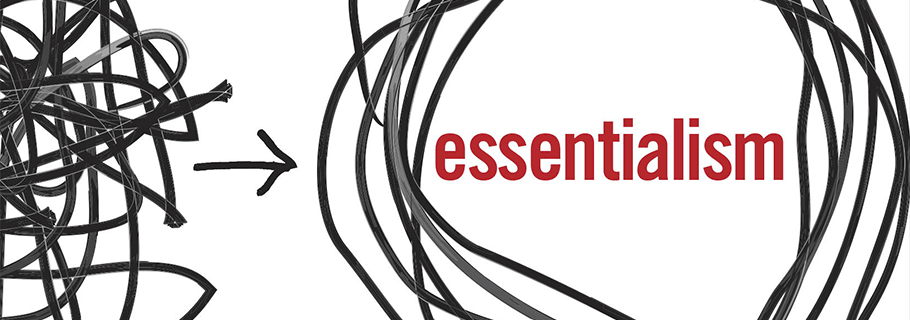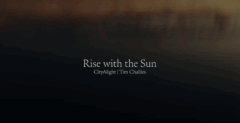Life is complicated. Life is full of responsibilities and opportunities, planned duties and serendipitous possibilities. There is so much we could do, but so little we can do. Many of us battle our whole lives to focus on those few, significant items that we should do must do, and yet so few of us ever feel like we are even nearly succeeding.
Help is here in the form of Greg McKeown’s book Essentialism. While it is not a perfect book, and while it benefits tremendously from adding a good dose of Christian thinking, it is one of the most helpful I’ve read on that constant battle to focus my time and energy on the right things.
McKeown believes in what he calls Essentialism and describes the basic value proposition in this way: “only once you give yourself permission to stop trying to do it all, to stop saying yes to everyone, can you make your highest contribution towards the things that really matter.” The Essentialist pursues fewer but better opportunities and is rigidly disciplined in rejecting the many to devote himself to the few. It is “not about how to get more things done; it’s about how to get the right things done.”
The way of the Essentialist means living by design, not by default. Instead of making choices reactively, the Essentialist deliberately distinguishes the vital few from the trivial many, eliminates the nonessentials, and then removes obstacles so the essential things have clear, smooth passage. In other words, Essentialism is a disciplined, systematic approach for determining where our highest point of contribution lies, then making execution of those things almost effortless.
Now that sounds good! That sounds like what we all want—a clear design to our lives that simplifies decision-making and amplifies each of the opportunities we pursue.
McKeown leads the reader to Essentialism in four parts:
- Essence. He begins by looking to the essence of Essentialism and the realities that make Essentialism a necessary but difficult practice today.
- Explore. Here he describes the way an Essentialist needs to think so he can pursue the highest possible contribution toward the best goals.
- Eliminate. Having determined the best goals, the Essentialist now needs to begin eliminating anything that will compete with the pursuit of those goals. “It’s not enough to simply determine which activities and efforts don’t make the highest possible contribution; you still have to actively eliminate those that do not.”
- Execute. And then comes the heart of it all—living in such a way that you now execute on those few goals, and continuing to follow the discipline of it.
McKeown promises his book “will teach you a method for being more efficient, productive, and effective in both personal and professional realms. It will teach you a systematic way to discern what is important, eliminate what is not, and make doing the essential as effortless as possible. In short, it will teach you how to apply the disciplined pursuit of less to every area of your life.”
And I think it can do that. It is chock-full of excellent insights and quoteable phrases. It is the kind of book you can use to implement systems in your life, or the kind of book you can plunder for its big and important ideas.
Yet the Christian reader will want to read it with some discernment. This is a book that benefits from an infusion of the biblical ethos. As the book reaches its end, McKeown expands Essentialism to all of life and here he stops quoting business gurus and begins quoting religious gurus; the last chapter is easily the weakest and one that can be skipped without any great loss.
Reading the book through a Christian lens improves it significantly. McKeown writes about people who always say “yes” and are afraid to say “no.” That sounds like a classic diagnosis of fear of man, a person so motivated by the praise of man that he takes on too much and says no to too little so he can win the praise of other people.
Not only that, but God has a way of diverting us from what we believe are our most important tasks. He diverts us to tasks he determines are even more important, and a too-rigid adherence to Essentialism may keep a Christian from allowing and embracing those divine interruptions. Read the gospels and the book of Acts and you will see how Jesus and the Apostles were extremely focused, but also very willing to depart from their plans. Implementing Essentialism too rigidly may just lead to a self-centered life rather than a life of service to others.
Reading through that Christian lens also allows us to see that Essentialism can be a means through which we honor and glorify God. It propels us to consider where God has specially gifted and equipped us to serve him and his people. Again, “Essentialism is not about how to get more things done; it’s about how to get the right things done. It doesn’t mean just doing less for the sake of less either. It is about making the wisest possible investment of your time and energy in order to operate at our highest point of contribution by doing only what is essential.” The principles of Essentialism, read and applied through the Bible, will help us understand how we are uniquely created and burdened by God to meet specific needs. And, equally helpfully, it will steer us away from those areas where we cannot contribute nearly as well.
I heartily recommend the book, provided you read with Essentialism in one hand, and the Bible in the other.
Let me close with a few of my favorite quotes:
- In many cases we can learn to make one-time decisions that make a thousand future decisions so we don’t exhaust ourselves asking the same questions again and again.
- If you don’t prioritize your life, someone else will.
- We can either make our choices deliberately or allow other people’s agendas to control our lives.
- There are three deeply entrenched assumptions we must conquer to live the way of the Essentialist: “I have to,” “It’s all important,” and “I can do both.”
- If … people are too busy to think, then they’re too busy, period.
- Making our criteria both selective and explicit affords us a systematic tool for discerning what is essential and filtering out the things that are not.
- Motivation and cooperation deteriorate when there is a lack of purpose.
- Half of the troubles of this life can be traced to saying yes too quickly and not saying no soon enough.
- “We need to learn the slow ‘yes’ and the quick ‘no.’”










